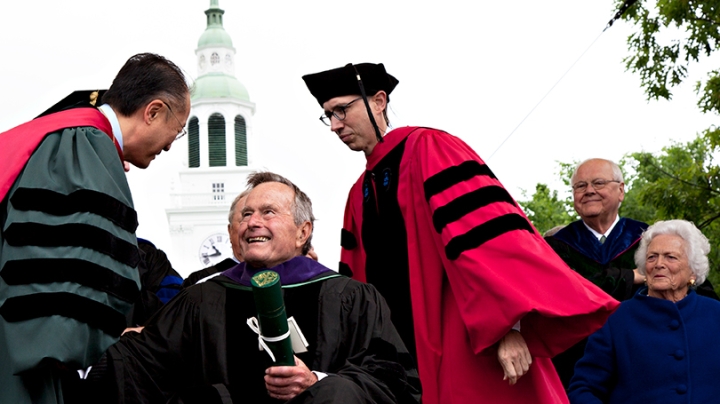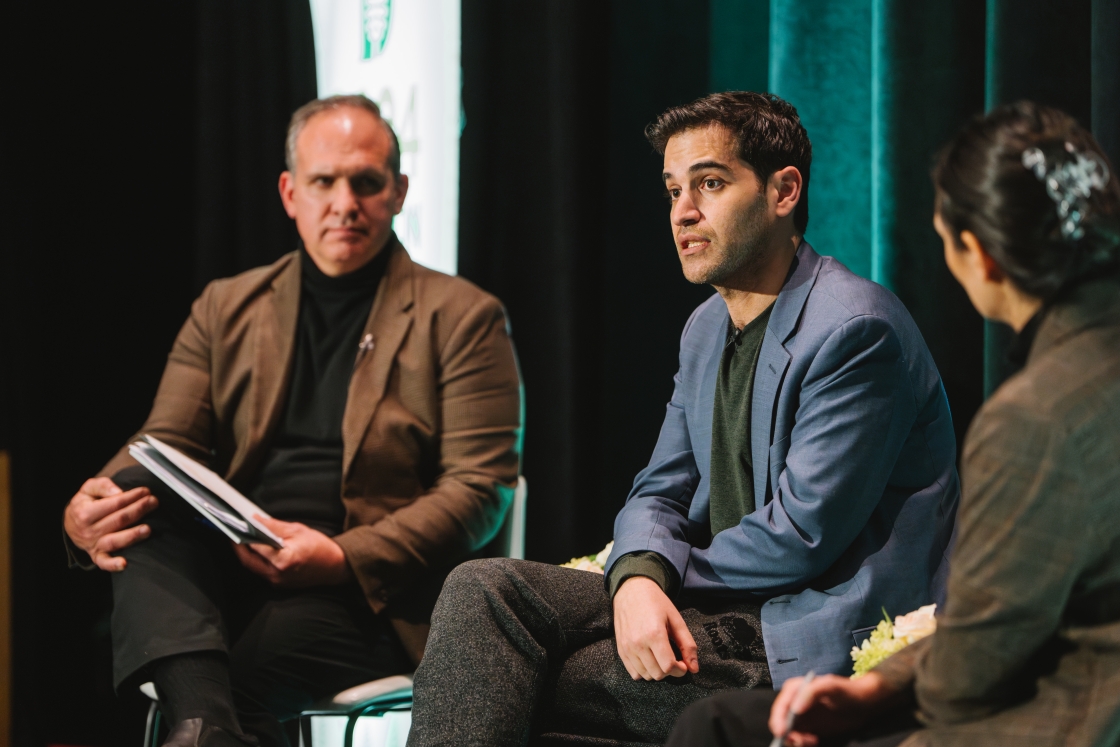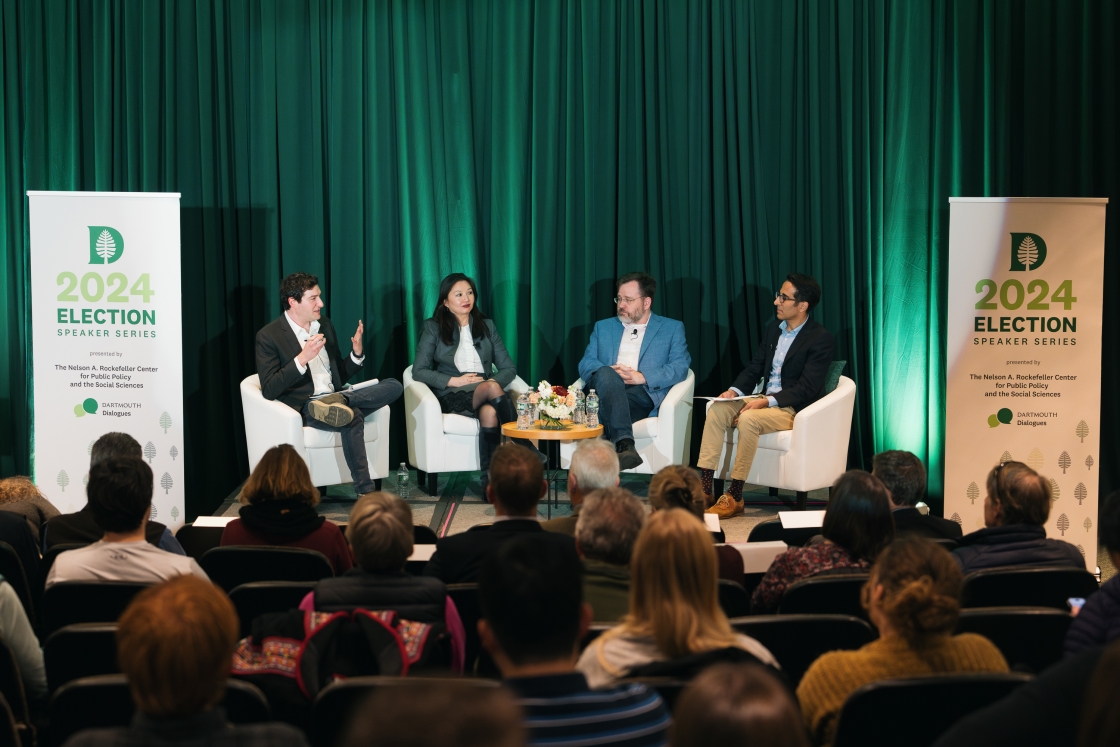Former President George H.W. Bush, who died yesterday at the age of 94, is remembered as a gracious, energetic, and patriotic man by members of the Dartmouth community. The nation’s 41st president was honored by the College in 2011, when he was presented with an honorary doctor of letters degree.
“You command our gratitude not only for your accomplishments, but also for your example: love of country, devotion to family, integrity, and selflessness. In the magnificent life of the forty-first President of the United States of America, Dartmouth will forever join all Americans in finding a source of inspiration and courage,” reads the honorary degree citation, which then-Dartmouth President Jim Yong Kim read to a crowd of more than 12,000 on the cold, overcast June 12.
It was so cold, in fact, that Bush and the others sitting on the commencement stage—including his wife, Barbara Bush, and commencement speaker Conan O’Brien—were given Dartmouth green blankets and mittens in effort to stave off the chill. The blanket on Bush’s lap covered his blue Yale socks, recalled Mimi Simpson, Tuck ’89, executive director of the Office of the President, who is in charge of advance planning for honorary degree recipients.
The ceremony featured an impromptu singing of “Happy Birthday” to Bush, who turned 87 that day.
The Bushes and their team, including more security than at most Dartmouth commencements, were expecting a tightly orchestrated ceremony. Simpson remembers walking the route from the Hopkins Center, across the Green, to the stage to time how long it would take Bush, who was then using a wheelchair, to get to the stage. The advance planning paid off, with the Bushes, who Simpson remembers as “gracious and inquisitive,” giving Simpson a presidential pin after the event.

Bush almost didn’t make it to commencement, recalls Peter Robinson ’79, trustee emeritus, whose first job after graduation was working for then-Vice President Bush.
Robinson had nominated Bush for the honorary degree and helped arrange the former president’s visit. But the day before the ceremony, Bush’s chief of staff emailed Robinson to say that the former president had come down with a virus and wasn’t feeling well. He and Mrs. Bush might not be able to make the trip, Robinson was told. The next morning, cold and rain in Hanover made the trip even less likely. Robinson learned that Bush’s physician had advised against the Bushes traveling to Hanover from their summer home in Kennebunkport, Maine. Mrs. Bush agreed with the doctor, as did the chief of staff.
Just as he was about to tell Dartmouth officials that the trip had fallen through, Robinson said he received one more email from the chief of staff. Robinson finishes the story: “The former president, the chief of staff explained, had carefully considered everyone’s advice—and rejected it. ‘He doesn’t want to let people down,’ she said. There are a hundred dissertations still to be written about George Bush and his place in our history. But if you want to grasp his character, this incident—this visit to Hanover on a frigid, blustery spring day seven-and-a-half years ago—represents a good place to start. Eighty-seven-years-old and confined to a wheelchair, he would still rather put himself out than let anyone down.”

Sergei Kan, a professor of anthropology and Native American studies, had written a letter to the student newspaper, The Dartmouth, in support of giving Bush an honorary degree. “As a result, the president asked to meet with me right before the start of the commencement ceremonies,” remembers Kan. “During that meeting he warmly thanked me for my support and signed my copy of his book, All the Best.” At right is men’s hockey coach Bob Gaudet, who pushed Bush’s wheelchair during the commencement procession.
The Bushes’ visit to Hanover was recalled a few years later, when former College President James Wright and his wife, Susan, were at a favorite restaurant in Kennebunkport. The Dartmouth president happened upon both Bush presidents and their wives, and the senior Bushes fondly recalled their 2011 day on campus, remembers Wright.
Here are recollections of earlier meetings with Bush:
Marjorie Rose, a senior lecturer in economics, worked in the Reagan-Bush administration for the Council of Economic Advisers but didn’t meet Bush then. It was at a chance encounter in 2007, a fundraiser for Barbara Bush’s Literacy Foundation, that Rose found herself seated next to George Bush.
“He was one of the most easy-going and charming people I have met—it was like talking to the guy next door,” recalls Rose. “We chatted about what were the books on his bedside table (I discovered he liked to ”dip into“ several books at a time).
”I recall the discussion veered to his experience in China. Many people are not aware that President Bush was the first unofficial liaison for the U.S. government in Beijing from 1971-75 after Nixon’s historic visit. As he recounted his China experience at the lunch, you could hear the emotion in his voice on how significant this was in his own perception of his role in U.S. Chinese relations.“
Tuck Dean Matthew Slaughter, a member of the Council of Economic Advisers in the Executive Office of the President from 2005-07, recalls meeting Bush in December 2006 at the U.S. embassy in Beijing.
”I was working with Hank Paulson ’68. Hank was secretary of Treasury and we had traveled with other U.S. government officials to China for the inaugural Strategic Economic Dialogue between the United States and China. Upon landing in Beijing, our delegation, which Hank led, traveled to the U.S. embassy for a dinner to preview the start of the SED the next morning. Former President Bush happened to be visiting China at the time, and, true to his sense of service, he arranged to make a surprise visit to Beijing to wish good luck to our delegation.
“His visit was an amazing blend of graciousness, wisdom, and energy. He first took the time to introduce himself to and chat a bit with each delegation member—and to me he quipped how much he always enjoyed when Yale beat Dartmouth on the athletic fields. He then extemporaneously delivered a riveting 20-minute discourse on U.S.-China relations that was a tour-de-force in which he drew on his vast knowledge of China based on how integral that country was across the arc of his professional career.”
Daniel Benjamin, the Norman E. McCulloch Jr. Director of the John Sloan Dickey Center for International Understanding and a former U.S. ambassador and counterterrorism coordinator under President Obama, was a young correspondent for TIME magazine in 1992 when he was sent to Munich to cover the G7 Summit, where President Bush was meeting with the leaders from the six other largest economies in the world.
“The summit took place in early July amid gorgeous sunshine and serious nervousness. It was the biggest event in Munich since the murder of 11 Israeli athletes by Palestinian terrorists at the 1972 Olympics—a disaster that had left German security forces shamed by their own incompetence. As if to erase that memory, the Bavarian authorities swung to the other extreme. Thousands of heavily armed police swarmed the streets in riot garb. On the first day, some 450 protestors were arrested; the cops were swinging their clubs.
”G7s tend to be boring stories—lots of press conferences, lots of diplomatic logjams, little news. The stories from the summit described a diminished role for the American delegation, which was hoping for economic policy moves that might help the U.S. get out of its economic rut. Despite it all, the president radiated good spirits—he loved high-level diplomacy and if he had any inclination to moodiness, he never showed it. And he was imperturbably well-mannered.
“At a joint press conference with German Chancellor Helmut Kohl, an activist—I think he was one of Germany’s many opponents of nuclear power— had somehow gotten press credentials and insinuated himself into the audience. Shortly after the event began, the protestor jumped up and started screaming at leaders up on the stage. Instantly, police were on him, and the treatment wasn’t gentle. From where I sat, it looked they were pummeling him into submission and dragging him out at the same time.
”Kohl was grinning broadly and even laughing while enjoying the pounding. Bush, however, called for him to be left alone. No, no, he said, let go of him. The assembled reporters seemed somehow shocked by his intervention. Let him speak, the president demanded. The cops let go of the man, who stood up, composed himself, and delivered his statement. Bush, if memory serves, rebutted him briefly but politely, and the disturber of the peace left the auditorium on his feet.
“The incident got no write-up, though I’ve looked high and low for it. But for this young journalist—who, by profession, was supposed to be immune to patriotic feelings—it was a remarkable moment. President Bush had done something that struck me as impressive and deeply American on another leader’s stage. With a single brief but determined act, he had made a stand for free speech and basic decency. That moment has stuck with me ever since, including through almost 10 years of work in Democratic administrations. To this day, the qualities George H.W. Bush showed in that instant have been at the heart of what, in my view, an American president should be.”
Dick Winters, the Remsen Professor Emeritus of Government, was director of the Nelson A. Rockefeller Center for Public Policy in 1988 when Dartmouth and the University of New Hampshire were hosting presidential debates. He recalls a nervous moment at the start of the event. The GOP candidates—Bush, Jack Kemp, Bob Dole, Pat Robertson, and Pierre DuPont—were at Dartmouth and the Democrats were at UNH. NBC journalist John Chancellor moderated the debate, which was broadcast on PBS.
“The afternoon before the evening’s debate, we met with the candidates on stage at Spaulding and showed them their rooms downstairs at the Hop for the candidates and staffs to gather before the debate. The program was for me to introduce then-Dartmouth President James Freedman who welcomed the crowd and he was to introduce Chancellor. Before my introduction, I raced downstairs to check in with the candidates and all were there but Bush. After my intro and as Freedman spoke, I checked again, and still no Bush. I waited around for a few minutes and as Freedman was concluding, I went back to the stage wing where the candidates were gathered. No Bush. As Chancellor began the candidate introductions—in alphabetical order—Bush was at my elbow, suddenly teleported, as it were, to my side and the debate went forward uneventfully.”



